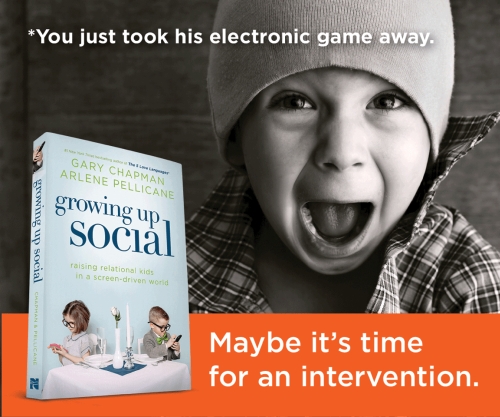I’ve been working on reading a book by Gary Chapman and Arlene Pellicane called “Growing Up Social: Raising Relational Kids In A Screen-Driven World“. You’re probably familiar with Gary Chapman and his book “The 5 Love Languages”. In this book, the authors deal with the issue of our kids growing up in a society where they’re constantly connected. They are continually confronted with screens around them with constantly moving pictures and audio. Reading this book should equip you with the following skills and actions you can begin using immediately to make a difference in your family.
- Equip your child to be relationally rich in a digital world
- Replace mindless screen time with meaningful family time
- Establish simple boundaries that make a huge difference
- Discover what’s working for families that have become screen savvy
- Learn healthy ways to occupy your child while you get things done
Here’s a video introduction to the book to give you a broader view of what you’ll be learning about in the book.
[youtube]http://www.youtube.com/watch?v=A-ANoYvKA1k[/youtube]
It’s an intriguing paradox to be so connected with devices and applications that let us immediately connect with our family and friends across the nation and around the world. So much for the adventure of a pen-pal as a kid, you can now actually see for yourself what it’s like for someone else living in a foreign country that’s a kid like you.
I’m in a bit of a challenge here with myself on this topic. You see, I make my living online. I assist various individuals and organizations with their online activity and Internet marketing. Above and beyond that, I absolutely love what I do so I’m passionate about continually improving my own awareness and skills of online activity. It’s a challenge for me to try and keep a balance between my work, my enjoyment of the topics and my family and other responsibilities. I was excited about reading this book as I’m sure I would find some strategies and tips for managing my own online behavior. With that being said, I also have no desire to think about eliminating my kid’s exposure to screens in their life. I believe, as with everything each of struggles, it’s all about being disciplined and in control of our actions and thoughts.
One of the interesting items mentioned in the book that I hadn’t really thought of before was that digital screens (and digital anything for the most part) gives immediate rewards. There is an immediate response given and provided for activity and actions taken. There’s far less learning the self-discipline of delayed gratification for kids these days. I’ve seen this (and been irritated myself) even as I’ve watched my kids play video games. I played a lot of video games as I was growing up, sometimes for hours on end trying to conquer the latest edition of Mario Brothers or some other Nintendo game I was playing at the time. We didn’t really have cheat codes or discs we could put in to get the quick win. We had to put in time and effort learning and getting better at actually playing the game before we accomplished the achievement of beating the level boss or making it to the next board. Even in my own kids I’ve seen the result of wanting the quick and easy way out.
In addition to that there’s also the far too common activity these days of awarding everyone that participates in something with a trophy. That doesn’t provide any of the additional motivation that kids should have to push themselves harder to do what it takes to actually achieve something worth getting a trophy. The trophy is delayed gratification. You have to work hard. You may not get or earn a trophy your first year playing a sport, but you come back next year to keep getting better and win the trophy the next time.
As I mentioned earlier, there’s definitely a lot of discussion in the book about getting our own adult lives disciplined and in control. Perhaps the best way to ensure success in our children is to do our best to model it in our own lives as well. My wife has done a good job of trying to get us to avoid having our cellphones at the table during meals. My own mature parents have established the rule with their own group of friends that if you’re caught with your cell phone at the table, you pick up the bill… for the entire table! There’s some less-carrot, more-stick motivation for you. However, I think even that solution presents its own challenges, particularly when I’m trying to get in touch with my parents for some reason and they’ve left their cellphones in the car!
Another nice thing about this book is that it would be perfect for a parent’s group study to read together. Luckily, we’ve found a church after moving to a new state and town that has a small group study for parents while the youth have their services and activities at the church on Wednesday nights. I could definitely see our group working through this book and discussing it each week after reading each chapter. I may present this to them as an option after our current study on the family.
So, if you’ve got kids of just about any age, and you’ve got any kind of mobile device or technology in your home with a screen on it, then you’d probably be interested in picking up this book and reading through its pages for yourself. I’m sure, like I did, you’ll find plenty of insight, inspiration and encouragement to be better at balancing technology with the reality of sharing life with real people on this planet; particularly your own children.
If you’d like to win your own copy of the book to read, just leave do one of the following. You’ll get an entry for each one you do:
- leave a comment on the post below
- leave a comment on the Facebook link to our post
- share our Facebook post link
- reply to our tweet
- retweet our link
- leave a comment on Google+ page
- share link on your own Google+ page






